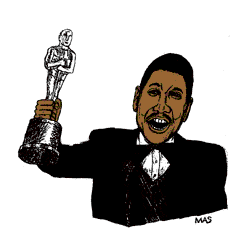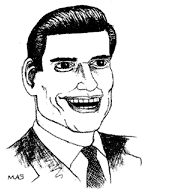
Event
The 69th Academy Awards. The $100 million production budget and performances by Madonna and Celine Dion apparently were not enough to make this year's Oscar night memorable. Even a "semi-spontaneous tribute to Muhammad Ali couldn't rescue the festivities," says Brian Lowry of the Los Angeles Times. Redeeming features included the return of master of ceremonies Billy Crystal and his "repeated relief from the pretentiousness of presenters" (Tom Shales, the Washington Post); Jessica Yu's crack that her evening's outfit cost more than her Oscar-winning documentary; and David Helfgott's performance of Rimsky-Korsakov's Flight of theBumblebee. (See "The Week/The Spin" for more on the results.)
Art
"1997 Biennial Exhibition" (Whitney Museum of American Art, New York City). Usually the most controversial group show in the United States, this year's much hyped selection of the best American art of the last two years is deemed smart but overly polite. New York's Mark Stevens says "this biennial is rife with safe curatorial decisions and art that has already been widely certified." The New York Times' Michael Kimmelman says the exhibit reflects nothing less than the state of contemporary art: derivative and self-conscious. (Click here for the Whitney's site.)
Willem de Kooning (1904-1997). Obituaries of the painter pronounce his death the end of an era: "[T]he almost terminally Warholized American art world loses ... a link with its last heroic--indeed, its last sincere--grand style" (Peter Plagens, Newsweek). Critics also seize the opportunity to weigh in again on de Kooning's late work, currently on exhibit at the Museum of Modern Art. "These are among the saddest things ever made by a once-major artist," says Time's Robert Hughes. (See Slate's review of de Kooning's late work.)

Movies
Liar Liar (Universal Pictures). The latest comedy by smirkmeister Jim Carrey (Ace Ventura: Pet Detective), currently the No. 1 film at the box office, is deemed his most conventional movie yet. Carrey, playing a sleazy lawyer forced to tell the truth for a day, "removes the rubber nose and plays a realistic human being" (Rita Kempley, the Washington Post). But the film still relies on Carrey's "kamikaze elan" to overcome its meager premise ("[a] one joke movie"--Susan Wloszczyna, USA Today). And The New Yorker's Anthony Lane says director Tom Shadyac (The Nutty Professor) blunders in choosing, midfilm, "to calm down the proceedings, [so that] our poor hero is reduced to saying therapeutic things like ...'You know, this truth stuff is pretty cool.' " (The Liar Liar page is good for some lawyer bashing, and serves up stills and clips.)
Crash (Fine Line Features). Despite the ruckus surrounding David Cronenberg's adaptation of J.G. Ballard's novel Crash--the movie was banned in England and won a special prize at Cannes for "originality, daring, and audacity"--it fails to shock. Time's Richard Corliss calls the quasipornographic narrative of car-crash survivors who go on to have a lot of sex while driving "sexual without being sexy." The New Yorker's Lane calls it boring and pretentious: "The characters in Crash are so unsmiling--so driven, in every sense--that they make you ashamed of ever having enjoyed yourself." Cronenberg and Ballard should not even get credit for coming up with a novel idea, says New York's David Denby: "The men and women who make TV commercials have sensed the connection between automobiles and eroticism for decades." (See Luc Sante's review of the film in Slate. Crash's Web site deserves its NC-17 rating.)
Selena (Warner Bros.). Lukewarm reviews for El Norte director Gregory Nava's reverential biopic about the slain Tejano singer. Some praise Nava for giving the film the same crossover appeal as Selena herself. Others damn it as formulaic. "Boilerplate," says the Los Angeles Times' Kenneth Turan, pointing out that the flashbacks are cheesy, the characters stock, and the themes, such as the subplot about unrequited love, tired. (See Warner Bros.' site for the film. Also check out Sarah Kerr's review and Jared Hohlt's "Life and Art" column in Slate.)
The Godfather (Paramount). Once again, critics declare Francis Ford Coppola's masterwork (re-released on its 25th anniversary) the quintessential American epic. "Every scene is weighted, emotionally significant, resplendent with the thick texture of feeling and history," writes New York's Denby. The New York Times, however, pursues the revisionist line. Cultural critic Edward Rothstein attacks the film's central metaphor--the Mafia family as metaphor for the American family--as untenable. And Molly Haskell says the film "demeans and demotes women outrageously." (Paramount plugs the re-release on its site.)
Books
The Coming Conflict with China, by Ross H. Munro and Richard Bernstein (Knopf). Critics agree with the premise of this get-tough-on-China polemic but think the authors, two former Beijing bureau chiefs, go overboard with the Cold War rhetoric. In the New Republic, Robert Kagan says the authors' mild policy prescriptions won't solve the problems they shrilly decry. If anything, their book only makes things worse, says Orville Schell in the New York Times: Bernstein and Munro "have unrepentantly plunged harpoons into the tenderest interstices of the Chinese-American relationship."
Radical Son: A Journey Through Our Times, by David Horowitz (Free Press). The memoir of this former ally of the Black Panthers turned scourge of the New Left draws cheers and jeers from predictable quarters. The Weekly Standard's John Podhoretz compares Horowitz's conversion to conservatism to Whittaker Chambers' magisterial tale of apostasy, Witness. Leftists dismiss the book as score-settling and name-calling. Nicholas von Hoffman in the Los Angeles Times says Horowitz wastes "much too much space ... calling his former radical collaborators cowards and poltroons."
Updates:
After a barrage of vicious pans, two critics defend The Kiss, Kathryn Harrison's incest memoir. In the New York Times Book Review, Susan Cheever says "the book brilliantly, heartbreakingly" lays out Harrison's helplessness. Also see Luc Sante's "Hey, Wait a Minute" in Slate. The New York Times' Frank Rich attributes the Harrison hype to the Hollywoodization of publishing. He quotes an editor who says, "We all know that if Kathryn Harrison"--who is highly photogenic--"were a dumpy-looking lady with Coke-bottle glasses, none of this would have happened." ... The Washington Post's John Schwartz deems "irresponsible" Richard Rhodes' "apocalyptic" predictions in Deadly Feasts that mad-cow disease could kill 200,000 people in Britain by 2015.
Recent "Summary Judgment" columns:
Movie--Return of the Jedi: Special Edition;
Movie--City of Industry;
Opera--Jackie O;
Theater--Antony and Cleopatra;
Book--Arkansas: Three Novellas, by David Leavitt;
Book--Deadly Feasts: Tracking the Secrets of a Terrifying New Plague, by Richard Rhodes;
Book--Resurrection: The Struggle for a New Russia, by David Remnick;
Book--The Three-Arched Bridge, by Ismail Kadare, translated by John Hodgson.
Movie--Private Parts;
Movie--Jungle 2 Jungle;
Theater--A Funny Thing Happened on the Way to the Forum;
Book--The Kiss: A Memoir, by Kathryn Harrison;
Book--Giovanni's Gift, by Bradford Morrow;
Art--"Exiles and Émigrés: The Flight of European Artists from Hitler";
Television--The Practice.
Movie--Donnie Brasco;
Movie--Smilla's Sense of Snow;
Music--David Helfgott World Tour;
Television--Crisis Center;
Television--Feds;
Television--Arsenio;
Television--Just Shoot Me;
Book--Crazy Rhythms: Richard Nixon and All That Jazz, by Leonard Garment;
Books--First Novel Roundup;
Theater--The Last Night of Ballyhoo.
Movie--The Empire Strikes Back: Special Edition;
Movie--Lost Highway;
Movie--Rosewood;
Television--Schindler's List;
Television--Miss Evers' Boys;
Book--Monster: Living Off the Big Screen, by John Gregory Dunne;
Book--American Sphinx: The Character of Thomas Jefferson, by Joseph J. Ellis;
Book--Whittaker Chambers: A Biography, by Sam Tanenhaus;
Theater--Stanley.
--Compiled by Franklin Foer and the editors of Slate.
